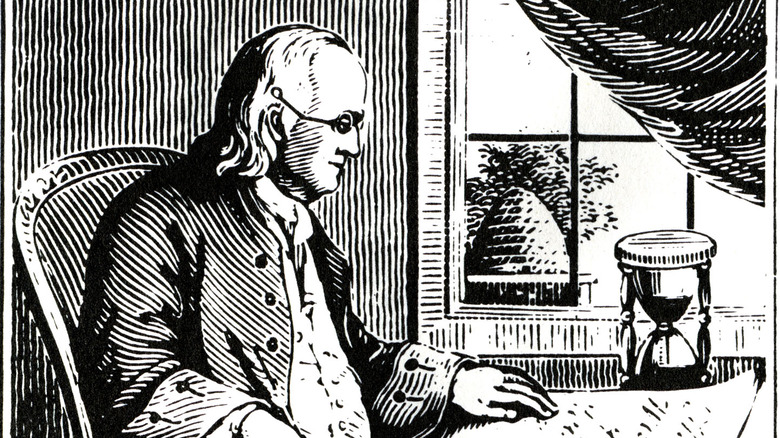Why Benjamin Franklin Invented The Urinary Catheter
Benjamin Franklin is well known as the inventor of a lot of things we still use centuries later, stuff like lightning rods, bifocals, political cartoons, and more. He was even the first human to look at a fish's fins and say, hmm... At just eleven years old, he invented swim fins for his hands. There was only one catch: his wrists couldn't take the exertion the way he'd designed them. Still, he was onto something.
According to How Stuff Works, we also have Franklin to thank for the "long arm," a reaching device he used to get books off of lofty shelves, the odometer, and the glass armonica, basically a collection of different shaped bowls to do the thing where you rub your fingers around the rims to make them vibrate. Not the most rockin' musical instrument around, but probably fun at a party. Then, in 1752, when his brother was suffering from a painful medical condition that required a possibly even more painful treatment, Franklin put his ingenuity to work to help his ailing brother out.
Benjamin Franklin realized a flexible urinary catheter would be more comfortable
Again, it may seem like one of those blatantly obvious insights that's actually surprising to hear someone had to think of first, but Benjamin Franklin is that person. As The Franklin Institute notes, having a catheter inserted back then was no walk in the park. Nothing more than stiff metal tubes, to call them uncomfortable would be an understatement. Franklin rightfully figured that it might make the process less painful if the tube were able to move along with the organ into which it was to be inserted.
So he went to his local silversmith and asked him to make the flexible catheter he'd designed. He had imagined a tube made of small interlocked silver rings that allowed it to move more like a hose. How Stuff Works notes that he wrote his brother and wished him luck. He admitted that his brother was to be the guinea pig for the product. "It is as flexible as would be expected in a thing of the kind," he wrote, "and I imagine will readily comply with the turns of the passage." In the age of plastics, it may seem terrifying to think of a catheter made of interlocking pieces of metal, but the device surely must have been a relief for Franklin's poor brother.

